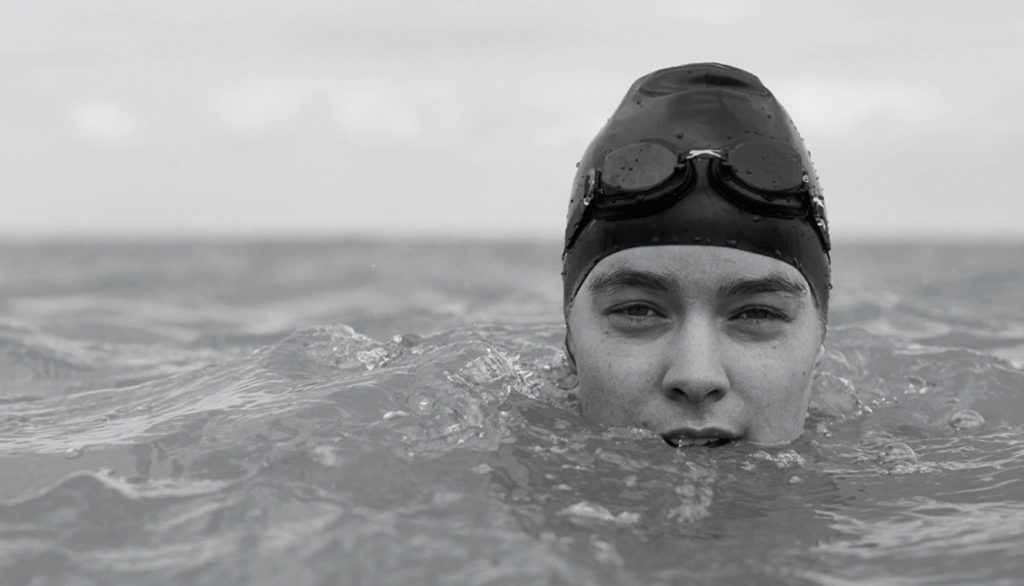Out Of Water, a new play by Zoe Cooper, has just finished a run at the Orange Tree Theatre. Alice Attlee reviews.

There is something unsettling at the centre of Zoe Cooper’s Out of Water. Recently performed for the first time at the Orange Tree Theatre, and directed by Guy Jones, the play follows a young couple as they settle into life in South Shields, making the transition from London to this wilder, stranger place.
Claire (Lucy Briggs-Owen), a schoolteacher, has followed Kit (Zoe West), a policewoman, back to her hometown. They have left the capital, the programme explains, ‘to be nearer family, to be nearer the sea, to put down roots. To have a baby’ – as the play begins, Claire is 17 weeks pregnant. As a list of reasons to move to a place, these are hard to fault. They encapsulate the stories of so many couples, moving away from the city in search of a slower, quieter life: they are settling down. Yet it is these hopeful enticements that begin to unravel as the play progresses, and we find that the lives of Claire and Kit are all but settled.
The second act opens with Claire chucking a bucketful of rainbow trout onto a green tarpaulin. She guts them without much skill but with much anger, sat on her kitchen floor. She recalls how, earlier that day in the fishmonger, Kit’s second cousin (or was it third?) had ‘slammed down the bloodied bag’ of fish down on his counter. A display of disapproval, it is implied, of Kit and Claire. While Kit’s mother is unerringly supportive of her daughter and partner, the family, and the community at large, does not always make it easy for the couple to settle into life in South Shields. Cooper is particularly deft at constructing and describing moments like this: hard-to-define micro-aggressions, easy to refute but difficult to forget, to which Claire is particularly sensitive.
As the scene continues, Kit regales Claire with stories of a childhood spent outdoors and on the water. She completes her anecdote: ‘South Shields is part of who we are, it’s where we’ve always lived. It might be a bit of a shithole…But it’s home.’ Claire – stressed by work, by her pregnancy, and the dramatic upheaval to the North East, edits this narrative: ‘You’ve not lived up here for years and you haven’t gone crabbing since I’ve known you. And I’m not from here.’
The sensation of rootedness, and of belonging, is dependent on the stories we tell about ourselves. Much of the power of this play comes from the re-telling, and re-shaping, of events we have only just witnessed. Characters turn away from one another to explain to us, the audience, what is really going on; how things really are. We are never allowed to forget that what we are watching is a play – but, the characters imply, we are watching something that has actually happened. After the scene in the kitchen ends, Kit accuses Claire of ‘interrupt[ing]’ her: some of their argument has been left out in the replay we have just seen. Kit turns to the audience, and finishes her story, filling in the gaps – uninterrupted, and away from the scene itself.
Engaging the audience in this way makes us uncomfortably complicit in the spinning of life into narrative. There are three main characters in Out of Water: Claire, Kit, and Fish – a fourteen year-old pupil of Claire’s, who goes by the pronouns they/them. Fish, played by Tilda Wickham, is certain that they descended from aquatic apes. That is the story they wish to tell – their explanation of where they come from.
In the closing moments before the interval, Fish stands on the shoreline of South Shields. They have just emerged from the Atlantic Ocean, having dropped down a slope, and into ‘cold, cold water’. They tell the audience how, once immersed, they like to concentrate on slowing down their heart rate – ‘shutting off their lungs’ until they feel their ‘gills opening’. It is unclear how much of this Fish believes – they describe themselves swimming for ‘meters and meters’, but also ‘miles and miles’. As they emerge from the water, Fish sees, but is not seen by, Kit and Claire, who are also on the beach.
Only Briggs-Owen, West, and Wickham perform in Out of Water – the cast doubles other roles within the play. Yet this is one of the only moments when all three main characters are placed within the same setting at the same time. The characters live side-by-side – South Shields is a small town after all – but we see, as they turn to us again and again, how each character’s narrative, even of shared events, differs. Each wants to tell the story slightly differently, because each wants their own narrative, their own sense of self, and their own perspective, to be properly understood. And so we come to the unsettling heart of Cooper’s new play: ideas of rootedness, and identity, might just be another set of stories that we tell.
*
The playtext for Out of Water is available here.
Alice Attlee is a writer and editor living between London and Cornwall. Her work has most recently appeared in the Times Literary Supplement and Dark Mountain. She also writes and records a monthly essay, ‘Letters on Foot’, about the walks she takes, the people that walk with her, and the things she thinks about while walking. From September, she will be researching Climate Anxiety in Contemporary Literature at Goldsmiths.